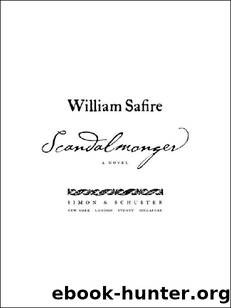Scandalmonger: A Novel by William Safire

Author:William Safire [Safire, William]
Language: eng
Format: epub
Tags: Fiction
Publisher: Simon & Schuster
Published: 2000-02-02T06:00:00+00:00
February 5, 1801
NEW YORK CITY
Hamilton was faced with a horrendous political dilemma. Having fought Jefferson in Washingtonâs Cabinet, having twice bitterly opposed Jeffersonâs election to the Presidencyâcould he now reverse himself completely and throw his support to the advocate of France and a weak central government? Contrariwise, if not Jefferson, could he entrust the nation in whose Revolution he fought, and whose Constitution he shaped, to the hands of a shrewdly calculating Burrâa voluptuary he knew to be worthy only of the deepest distrust?
Because he asked himself the right question, he did not have to agonize long. That question was: what would his lifelong mentor, George Washington, advise? He knew the answer. Forced to choose between Jefferson and Burr, Hamilton unhesitatingly chose the man whose philosophy he opposed over the man whose character he despised. The nation would be misled, its economy damaged, by the agrarian Jefferson; but it was in danger of being seized and the American system profoundly changed by the power-hungry and more energetic Burr. Sitting alone at his desk in New York, three hundred miles from the center of political action, Hamilton turned his mind to electing Jefferson and to destroying Burr.
He knew he no longer controlled the Federalist party as he once did. Noah Webster was no match for the high-Federalist Cobbett or the low-republican Callender, but he was the best writer the low-Federalist Adamites could offer. Webster wrote in an impassioned response to Hamiltonâs pamphlet that he was âthe evil genius whose conduct will be deemed little short of insanity, and who brought about our overthrow and ruin.â But Hamilton felt sure he was not without influence with some of the Federalists who were tempted to follow the bumptious opportunist, Burrâs Robert Harper, into a deal to maintain at least some of their power.
He drew a stack of stationery toward him and began to write letters to the men in the new capital city to whom he felt closest and who owed him the most.
To those of a religious bent worried about Jeffersonâs supposed atheism, he did not try to disabuse their fear because he, too, suspected that the man was godless. He countered, however, with his personal witness that he had heard Burr âtalk perfect Godwinismâ; that tied the irreverent Burr to William Godwin, the English dissenter who publicly denied God and married the notorious feminist Mary Wollstonecraft, whose antitraditional ârights of womenâ Burr also alarmingly embraced.
To friends doing business with England, he wrote that the French-loving Burr âcould not abandon his scheme of war with Great Britain as the instrument of his power and wealth.â To moralistsâthe few who stuck by him after the Reynolds pamphletâhe denounced Burr as a âprofligate and a voluptuary in the extreme,â which he knew him to be from several mutual women friends, especially Maria Reynolds. To associates in the law, he condemned the unlearned attorney as a kind of legal criminalââan extortionist in his profession, insolvent and dangerous.â
Hamilton found it much easier to denounce Burr than to find a word of praise for Jefferson.
Download
This site does not store any files on its server. We only index and link to content provided by other sites. Please contact the content providers to delete copyright contents if any and email us, we'll remove relevant links or contents immediately.
Anxious People by Fredrik Backman(2562)
The Last Thing He Told Me by Laura Dave(2198)
The Soulmate Equation by Christina Lauren(1923)
Not a Happy Family by Shari Lapena(1611)
Romancing Mr. Bridgerton (Bridgerton 04) by Julia Quinn(1521)
Slough House by Mick Herron(1442)
Life's Too Short by Abby Jimenez(1432)
The Switch by Beth O'Leary(1388)
Kiss My Cupcake by Helena Hunting(1379)
Solutions and Other Problems by Allie Brosh(1316)
Mordew by Alex Pheby(1269)
This Time Next Year by Sophie Cousens(1193)
A Rogue of One's Own by Evie Dunmore(1119)
No One Is Talking About This by Patricia Lockwood(1090)
The Mary Shelley Club by Goldy Moldavsky(1053)
Playing Nice by JP Delaney(1041)
Roadside Picnic by Arkadi & Boris Strugatsky(1039)
Squeeze Me: A Novel by Carl Hiaasen(1012)
American Psycho (Vintage Contemporaries) by Bret Easton Ellis(993)
